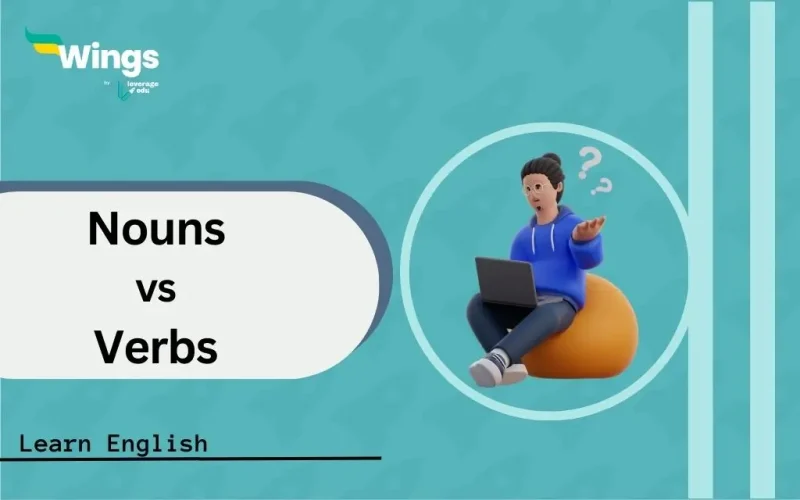Nouns vs Verbs: Nouns and verbs are two main parts of speech without which a sentence is incomplete. However, if you are a grammar nazi, then understanding the difference between the two is very important. While nouns are words that represent a concrete or abstract thing, such as living creatures, places, or actions, verbs are known as action words and are used in sentences to represent an action. To further understand the difference between the two, continue reading this blog.
This Blog Includes:
Must Read: All You Need to Know About Nouns
What is a Noun?
No sentence is complete without a noun. They are considered to be the building blocks of the English vocabulary. It is defined as a place, person, thing or idea. They act as subjects and objects in a sentence. Some common examples of nouns are girl, baby, tiger, zebra, books, wood, glass etc.
Nouns can be classified into several categories based on their characteristics. Given below are the types.
Proper Noun
Proper nouns are used to indicate the specific name of a person, place, or thing. Proper nouns always begin with a capital letter no matter where they are placed in a sentence.
Example: Italy, Charlie, London, Paris, Toyota, Maruti Suzuki etc
Common Noun
These nouns are used to indicate the class of a person, thing (object) or place. Unlike proper nouns, they do not begin with a capital letter unless they are placed at the beginning of the sentence.
Example: Lion, child, milk, television, rose, umbrella etc
Concrete Noun
A concrete noun refers to a physical thing, place or a person. It could be someone or something that can be perceived within the five senses (touch, hearing, sight, smell, and taste) of the body.
Example: Ocean, cake, boat, bottle, mouse, car etc.
Abstract Noun
This noun is opposite to concrete nouns. Here someone or something cannot be felt by the five senses of the body. It includes ideas, concepts or the state of things.
Example: Discovery, invention, beauty, bravery, love, hunger etc.
Check Out These Blogs!
| Proper Nouns | Common Noun |
| Abstract Nouns | What are Nouns? |
What is a Verb?
A verb is one of the most important components used in a sentence. They are used to denote or express activity, occurrence or state of being.
Like Nouns, verbs can also be categorized into two parts: Transitive verbs and Intransitive verbs.
Transitive Verbs
These verbs require objects, meaning, the receiver of the action is included in the sentence.
Example: Address, borrow, discuss, raise, offer, pay, write, have, promise etc.
Intransitive Verbs
In this verb, the sentence doesn’t require a direct object to indicate the person or thing acted upon.
Example: Run, sleep, wonder, travel, etc.
Also Read: All about Regular and Irregular Verbs
What are the differences between Nouns and Verbs?
So now that you know what is a noun and a verb. Let’s understand what’s the difference between the two.
| Particulars | Nouns | Verbs |
| Definition | Nouns are used to identify a person, place or object. | Verbs are used in a sentence to describe an action, occurrence, or state of being. |
| Usage | Nouns can be subjects or objects in a sentence. | They are used in forming the main part of the predicate. |
| Identification | Finally, they are inflected according to the grammatical number. | They are inflected according to the tense, number of people and case. |
| Examples | Chicago, hunger, cat | Walk, sing, eat |
How to Identify Nouns and Verbs within a Sentence?
Here’s a difference between nouns and verbs which will help you identify both within a sentence.
Identifying Nouns
Nouns can be identified by their function in a sentence. They can either be the subject of a sentence, the object of a preposition or the object of a verb.
Example
- Subject: The dog sat on the couch.
- Object: I saw the film last night.
Nouns can also be identified by their form. They can be either plural, singular, proper, common, abstract or concrete nouns.
Example
- Singular: Cat
- Plural: Dogs
- Concrete: House
- Abstract: Hunger
Identifying Verbs
Verbs can be identified by their function in a sentence. They are words which are used in expressing an emotion. They can also be identified by their form. They can be irregular, regular or can be other tenses.
Example
- Regular: Walked
- Irregular: Went
- Present Tense: Reena is eating food.
- Past Tense: Reena ate food.
- Future Tense: Reena will eat food.
Check Related Blogs!
| Singular vs. Plural Nouns | 25 Examples of Abstract Nouns |
| What are Possessive Nouns? | TOEFL Verb Sentences for Speaking and Writing |
| What are Material Nouns? | Verb Preposition with Meaning |
FAQs
Verb: Book, Girl, Baby
Noun: Moving, Swimming, Playing, Eating
Nouns are used to denote places, things and people. While verbs are used when an action takes place in a sentence.
The easiest way to find a verb is to change the time of the sentence and find the word that changes.
This was all about nouns vs verbs. Hope you understand the concept and know how to proceed. To advance your grammar knowledge and read more informative blogs, check out our Learn English page and don’t forget to follow Leverage Edu.


 One app for all your study abroad needs
One app for all your study abroad needs












 60,000+ students trusted us with their dreams. Take the first step today!
60,000+ students trusted us with their dreams. Take the first step today!